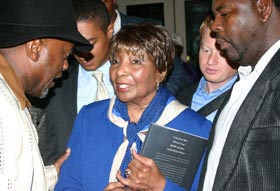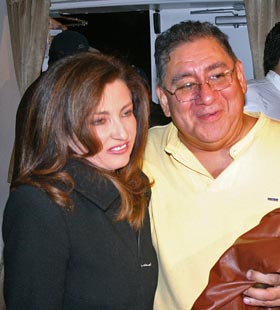Dallas County stays blue despite a wave of Republican red sweeping across the rest of the state, nation
DAVID TAFFET | Staff Writer taffet@dallasvoice.com
Although statewide results favored Republicans, Democrats swept all countywide races in Dallas County. The larger majority of Republicans in the legislature, however, will affect redistricting and could embolden some to file anti-gay legislation.
“Dallas County will still be a Democratic County,” said State Rep. Royce West at the election watch party at the American Airlines Arena on Nov. 2.
While pleased with the results throughout the county, Dallas County Democratic Party chair Darlene Ewing said her worry was redistricting.
New census figures will be reported in December. Then the newly elected legislature will redistrict state and federal legislative seats based on the new figures. She expects the state Democratic Party to file a challenge to the new boundaries should they be drawn to heavily favor Republicans.
In the U.S. House of Representatives, Texas should gain a seat. Eddie Bernice Johnson’s district is packed with a large number of the county’s Democrats, contributing to her 50-point margin of victory. Should the new district be carved partially from that area, the next congress might include a second Democrat from North Texas.
Should her district remain untouched, the area will likely elect another Republican.
Texas state House and Senate districts will also be reapportioned. Current district lines kept six districts safely in Democratic hands. Those races were unchallenged by the Republicans but made the rest of the area’s races remained uncompetitive for Democrats.
Ewing said that in 2000, the Justice Department appointees who reviewed redistricting plans were Republican. But no longer.
“This time they’re on our side,” Ewing said.
“We have more recourse with a Democrat in the White House,” said Stonewall Democrats of Dallas President Erin Moore.
Moore believes the Justice Department will look at the new map more critically than they had in the past. Redistricting should reflect neighborhoods, and that gerrymandering is done to get one party or the other elected, she said.
“With Republicans winning, we know they’ll draw some really squiggly lines to get what they need to win again,” said Moore.
Moore also worried about anti-LGBT bills that would become more likely to pass with a larger Republican majority. She said anti-adoption bills could be filed and anti-bullying laws would be less likely to pass.
“Numbers bring strength and confidence,” she said. “And they’ve been emboldened.
Within the Democratic Party, the number of delegates each state sends to the national convention is determined, in part, by the number of votes cast for the Democrat in the most recent gubernatorial race. She said more ballots were cast for Bill White this year than for Chris Bell in 2006.
In this election, White and other Democrats did much better in Dallas than across most of the rest of the state.
Of the straight party ballots cast, 53 percent went to the Democratic Party. By contrast, almost twice as many Republican straight party ballots were cast in Tarrant County than Democratic ballots.
In statewide races, White received 55 percent of the vote in the governor’s race in Dallas County. Across the state, Rick Perry won the election with 55 percent. The vote in Tarrant County reflected the statewide vote.
Other statewide races were all won by Republicans but were fairly evenly split in Dallas County. Republican Lt. Gov. David Dewhurst held a 2,000-vote edge over Democrat Linda Chavez-Thompson in Dallas. In other races, the Democratic challengers held a slight edge over the Republican incumbents across the county.
All contested Dallas County judgeships were won by Democrats. Winners took nothing for granted in their races, however.
“Somebody once told me there are two ways to run for office,” said Judge Carl Ginsberg. “Unopposed or scared.”
He said he got his message out and won with more than 52 percent of the vote, higher than most of the other winners. A number of Republican voters told him that they crossed over to vote for him.
Democrats also retained district attorney, county clerk, district clerk, and county judge and picked up a county commissioner’s seat.
However, in state House of Representatives races, Democrats lost all contested races in Dallas County. Two out of three Democratic incumbents also lost in Tarrant County. None of those races is a countywide contest.
Those losing their elections in Dallas included Carol Kent, Robert Miklos, Kirk England and Allen Vaught. In Tarrant County, Paula Pierson and Chris Turner lost their seats while LGBT community ally Lon Burnham retained his. Burnham has co-authored anti-bullying legislation.
“I think it was the national sentiment that hurt,” said Pete Schulte who challenged Republican incumbent Dan Branch for the House seat that includes parts of Oak Lawn and East Dallas.
“We lost a lot of good reps tonight,” Schulte said. “We fought a good campaign, but when federal politics takes center stage, it’s an uphill battle to combat that locally.”
Moore credits the Democratic win in Dallas County on the coordinated campaign of the county party, the get out the vote effort and a massive calling operation. But she called the results, “too close for comfort.”
Weather affected the outcome, Moore said. Traditionally, Republicans make up a majority of the early vote and Democrats are more likely to cast their ballots on Election Day. Rain affects turnout and more than three inches fell on Tuesday.
Elba Garcia was more upbeat in her assessment of the outcome. She beat 16-year incumbent Ken Mayfield by 5 percent.
She said voters spoke loudly about the change they want.
“We need this county to move forward,” she said. “Voters are tired of the finger pointing.”
Garcia said her experience in city government will benefit the county as she helps find ways for different entities together. Once elected, it doesn’t matter what party she ran on, she said, reflecting her experience as a city council member. The city council is elected in non-partisan elections.
Everyone on the Commissioners Court needs to work together on healthcare, public safety, education and economic development, Garcia said.
“Government is not exactly a business,” she said. “But it needs to be run professionally.”
This article appeared in the Dallas Voice print edition November 5, 2010.















